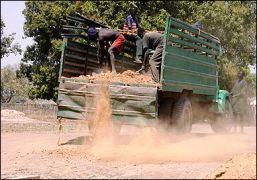Southern Sudan donates US$30 mln to UN Road Project
July 4, 2006 (JUBA) — The United Nations World Food Programme today received a donation of US$30 million from the Government of Southern Sudan (GOSS) for WFP’s massive road works project in the region.

|
|
A southern Sudanese crew repairs roads in the provisional capital of Rumbek. Reparing infrastructure is a priority of Sudan People’s Liberation Movement. |
“We are delighted to receive such a sizeable donation from the new southern Government for our roads project,” said Kenro Oshidari, Regional Director of WFP in Sudan. “We feel it is a vote of confidence in WFP’s hard work over the past three years to improve the region’s road system including crucial de-mining.”
It is the first significant humanitarian donation made by the southern
regional government, and the second donation this year to WFP from Sudan.
It is a major boost to the WFP project to help rebuild southern Sudan after
Africa’s longest war.
The WFP road project aims to rebuild more than 3,000 kilometres of roads in the war-ravaged south at a cost of US$183 million. Two decades of fighting between the north and the south destroyed the region’s road network and most other infrastructure, leaving the south isolated and economically crippled.
Pending sufficient funding for the roads project, the entire region will eventually be opened up by improving road links between Kenya and Uganda into Sudan. It will also connect the Nile River to key feeder roads. Once complete, it will be possible to travel by road from the southern borders of Sudan to Khartoum and onto Egypt for the first time in a generation.
Improved roads dramatically reduce the cost of transporting WFP food and other humanitarian supplies to remote communities. The new roads, combined with greater warehouse capacity and pre-positioning of food stocks before the rains, will help WFP to continue to reduce the relatively costly delivery of food aid by air lift and air drops. So far in 2006, WFP has cut air deliveries by 90% compared to last year.
Even after the GOSS’s landmark donation, the roads project still has a
funding shortfall of US$36 million. Apart from the roads project, WFP needs
US$746 million from donors in 2006 for its emergency operation to feed more
than six million people in the South, Darfur, the East and Three Areas of
Sudan.
The Government of Sudan in May donated 20,000 metric tons of sorghum to WFP
to feed displaced and vulnerable communities in the western region of
Darfur, following a critical shortage of food aid stocks.
Since late 2003, WFP has rebuilt roughly 1,400 kilometres of roads,
repaired bridges and culverts, and removed and destroyed some 200,000
pieces of unexploded ordnance in southern Sudan. The project has linked
major towns across the south and reopened trade routes with neighbouring
countries.
One of the near-completed roads runs between the town of Yei and the
southern capital Juba. It is a vital link used by traders coming from
Uganda. The road already carries heavy traffic, and the number of vehicle
movements has shot up from zero to 200 per day in the past year. As a
result, markets in Juba are booming.
According to a recent WFP survey, roads built so far have halved travel
time to markets, schools and health centres. Bus services now operate on
all major routes and the cost of public transport has decreased by 50 to 60
percent. The price of commodities has also fallen. In Juba, for example, a
bag of cement costs US$17 compared with US$29 last year. The roads project
employs 1,650 Sudanese nationals, including 250 working in de-mining.
Other donors to WFP’s Special Operation for Emergency Road Repair and Mine
Clearance of Key Transport Routes in Sudan include the United States
(US$72.5 million), Britain’s Department for International Development
(US$19 million), Japan (US$10 million), Norway (US$5 million), the
Netherlands (US$4.5 million), Italy (US$1.7 million), Switzerland (US$1.5
million), the United Nations (US$1 million), Canada (US$847,000), Australia
(US$730,000) and multilateral funds (US$86,000).
(ST)
